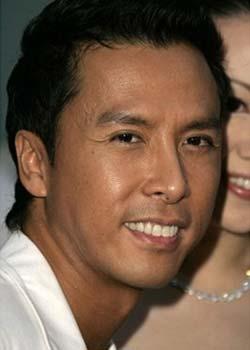Donnie Yen
 0 Comment(s)
0 Comment(s) Print
Print E-mail
CCTV, December 2, 2010
E-mail
CCTV, December 2, 2010
|
|
|
Donnie Yen, Hong Kong action star |
In 1996, after leaving out a contract deal placed by Jing Wong, Donnie signed with the independent film company My Way Film Co. and started experimenting with directing and camera shooting. In 1997, he finally made his directorial debut with Chin long chuen suet (1997) and had created a different style of martial arts choreography which made a huge impact around the world for its' daring, braving, and fresh attempt to accomplish something new for the then dying martial arts action trend; with equally many both admiring and looking down on this style. Donnie continued to work behind-the-scenes on projects such as Saat saat yan, tiu tiu mo (1998), Sun tong saan dai hing (1998), the German-produced TV movie Der Puma - Kämpfer mit Herz (1999) (TV) and its' TV series counterpart one year after.
In 2000, things took a turn for Donnie once again when US-based film company Dimension Films called and offered him a major role in Highlander: Endgame (2000) as the immortal Jin Ke, that became his Hollywood debut. But sadly, the movie didn't performed very well at the box-office and many fans consider it to be a part of its' own in the franchise. Despite this, many others also consider Donnie's action scenes to be highlights of the movie; especially his duel with Adrian Paul. To the movie's as well as Miramax's credit, offers was to be given for him shortly afterward. Donnie was invited to work behind the camera on Shura Yukihime (2001) for Japanese director Shinsuke Sato and Blade II (2002) by Guillermo del Toro, the latter of which he also appeared in briefly as the mute vampire Snowman.
In 2002 and 2003 respectively, Donnie's career went sky-high after he was offered and took up two memorable roles. Firstly, highly acclaimed Chinese director Yimou Zhang offered Donnie the part of assassin Sky in Ying xiong (2002) which starred Jet Li that resulted the most anticipated fight scene of 2002 and huge income at the box-offices around the world. Secondly, director David Dobkin casted him alongside Jackie Chan as the traitorous Wu Chow in Shanghai Knights (2003), the follow-up to Shanghai Noon (2000), which marked the first Donnie worked with him in his career. Both of these collaborations gave Donnie Yen more recognition in the States and back in Hong Kong which in turn gave him more opportunities as an actor and action director.
In the same year, Donnie decided to put hold of pursuing a career in Hollywood and flew back to Hong Kong to find quality work. Through his dear friend and Hong Kong cinema expert Bey Logan, he got signed up as action director on Chin gei bin (2003) which was produced by Emperor Multimedia Group Co. (EMG) and starred the pop stars Gillian Chung and Charlene Choi, and with Jackie Chan in a cameo appearance. The movie earned him a nomination for "Best Action Design" at the 2003 Hong Kong Film Awards and also the 2003 Golden Horse Awards, both of which he won. He continued to work in few movies after that, including Gin chap hak mooi gwai (2004) as director and action director, and Chin gei bin 2: Fa dou daai jin (2004) as actor, where he once again worked with Jackie Chan on an anticipated fight scene which was satisfying enough for fans.
Later on in 2004, Donnie's career took a different turn when Hark Tsui offered him a leading role in Chat gim (2005) which was an adaptation of a lengthy novel written by Liang Yu-Sheng about seven warriors and their mystical swords. Despite the disappointing box-office reception the movie got when it was released locally, the movie was nonetheless a great showcase for Donnie as an actor and action performer which differed his overall performance from his previous works. Around the same time, Donnie Yen also teamed up with Wilson Yip, another acclaimed director in Hong Kong, and together they made the highly anticipated crime drama Saat po long (2005) which successfully combined intense drama and unique storytelling/visuals with groundbreaking martial arts action that went on to become favored by many fans and Hong Kong movie viewers after its release. Donnie's way of shooting MA action, which was nothing like people had already seen, earned him a nomination and a price at the 2005 Hong Kong Film Awards for "Best Action Design". The movie also led to a trend of similar HK action movies where storytelling along with hard-hitting MA action was to be highlighted as much as possible.







Go to Forum >>0 Comment(s)